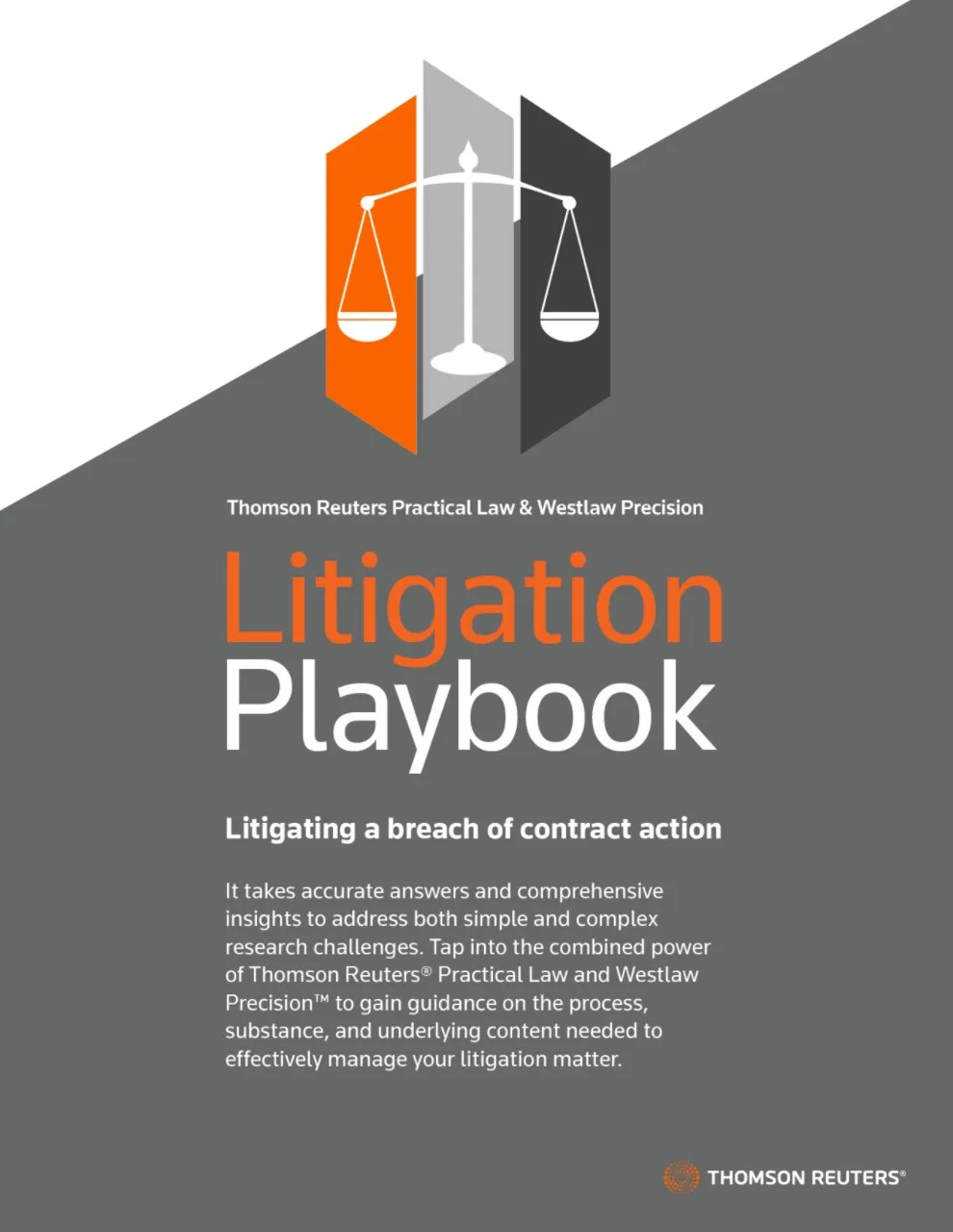In-House Lawyer's Guide to Breach of Contract, Part 1
Jump to ↓
| 1. Get all the facts oration |
| 2. Review the contract carefully |
| 3. Determine the type of breach |
| 4. What does the contract say about the type of breach? |
| 5. What is the remedy? |
| 6. Get outside counsel advice if the breach is serious |
| 7. Alert the business |
| 8. Determine the best path forward |
| 9. Implement changes |

Playbook
Litigating a breach of contract action: The answers you need and how to proceed when litigating a matter.
Download free playbook ↗As an in-house lawyer, one of the last things you want to hear (or discover) is that your company has (potentially) breached a contract. If true, you know that you are likely in for some type of fight and maybe even litigation in court or arbitration. Either path will take time and money – maybe a lot of each – to resolve. This is why it is critical to take several steps when you are analyzing a potential breach. What you find will determine the best way forward. Here is what you need to do:
1. Get all the facts
When you suspect a breach of contract start with all of the facts. Do not rely on only one source of information, “triangulate” from multiple sources to get to the truth. It’s not that people are lying or trying to mislead you, it’s just that different people will have different understandings of what has transpired. To do this properly, you must:
- Get a copy of the contract (and any amendments).
- Collect all relevant information and documents relating to the performance of the contract (communications between parties, performance reports, deliverables, payment records, and any complaints or feedback from the other side).
- Speak with all of the key players to help you put everything in context.
- Determine when the breach, if any, occurred.
- Learn if the other party knows about the breach.
- Find out if the other party is in compliance with the contract as well.
2. Review the contract carefully
Rely solely on your own judgment to ascertain whether the company has indeed violated the terms of the contract in question. Non-lawyers are notorious for reading things into, or out of, a contract with little heed to what the contract actually says. Or, they are simply not interpreting the agreement correctly. Either can drive unnecessary work or worry.
Ensure that legal analysis is conducted by qualified professionals and not influenced by individuals without formal legal expertise. Sit down with the agreement and – using the facts you have uncovered already – parse through it to understand the specific terms and conditions at issue, focusing on the obligations and provisions that might have been breached. Perhaps after you have reviewed the contract you fail to see a breach (good news!) or, alternatively, you believe that breach may have in fact occurred (bad news). If the latter, read on.

CoCounsel Legal
AI lawyers swear by: Trusted content, expert insights, and an all-in-one solution with ISO 42001 certification
See it in action ↗3. Determine the type of breach
If you believe a breach has occurred then do your best to determine whether it is a:
- Material breach – a significant violation or failure to perform the contractual obligations that result in substantial harm to the non-breaching party, undermining the very “essence” of the agreement. The breach goes to the heart of what was agreed upon, making it impossible for the other party to obtain the benefit intended from the contract. A material breach typically allows the non-breaching party to terminate the contract or cease its own performance under the same.
- Minor breach – a breach that does not substantially undermine the contract as a whole. A minor breach does not prevent the fulfillment of the contract’s fundamental purpose. Under a minor breach, the parties can still complete the contract essentially as agreed. The non-breaching party cannot terminate the contract but can seek damages for any losses incurred directly from the breach.
- Anticipatory breach – occurs when one party makes it unequivocally clear to the other that they will not meet their contractual duties, either through direct statements or actions. The non-breaching party is entitled to take immediate action upon the anticipatory breach. They do not need to wait until the contract performance is due to claim a breach.
4. What does the contract say about the type of breach?
When you have determined what type of breach may have occurred, go back to the contract and look for what the parties said would happen in case of a breach. These are the provisions that matter most here:
- Opportunity to cure
- Limitation on damages (liability caps, exclusion of consequential damages, etc.)
- Force Majeure – is the breach excused?
- Dispute resolution process (litigation, arbitration, waiver of jury, recovery of attorneys fees, etc.)
- Escalation process – a process the parties must follow to resolve issues before either party can sue or seek arbitration
- Termination (termination for convenience, material breach, etc.)
- Notice
- Injunctive relief
- Rights upon material breach
- Course of dealing (has the breach gone on so long that it is now an amendment of the contract?)
5. What is the remedy?
Consider next what types of damages (and amounts) or remedies might be available to the other party. Understanding this will drive decision-making on the part of the legal department and the executive team:
- Compensatory damages: Compensatory damages are intended to compensate the non-breaching party for the direct losses and costs incurred as a result of the breach. This includes the “expectation interest,” which is designed to cover what the injured party expected to receive from the contract.
- Consequential damages: Also known as special damages, these cover losses that do not directly flow from the breach but are a result of the breach. These losses must have been reasonably foreseeable at the time the contract was made.
- Incidental damages: These are expenses directly incurred as a result of the breach of contract, such as costs incurred to obtain a replacement for a failed contract or costs incurred in mitigating further losses.
- Liquidated damages: These are damages that are specified within the contract itself, to be paid out in the event of a breach. Liquidated damages must be a reasonable estimate of actual damages that might result from a breach; they cannot be punitive in nature.
- Specific performance/injunction: Instead of a monetary award, the court may order equitable relief, that the breaching party perform its obligations under the contract or stop doing “something” such as breaching a non-compete agreement.
- Rescission: This remedy involves canceling the contract and returning both parties to the positions they were in before the contract was made. Rescission is often coupled with restitution, where any benefit derived from the contract must be returned to the other party.
6. Get outside counsel advice if the breach is serious
If you have concluded that a breach did occur, it is material, and that substantial damages may be on the line, it’s time to have a discussion with your outside litigation counsel about what you have uncovered and see if (a) they agree with you and (b) what they would recommend as a next step. The voice and experience of an expert commercial litigator can help you put a fine point on what happened, the consequences of the breach, and how best to remediate the damage (including trying to avoid formal litigation). Additionally, check to see if you have insurance that covers the breach.
7. Alert the business
At some point, you will alert the right parties in the business that there is a potential breach of a contract by the company and a risk of litigation (and material damages). This should be a privileged communication as it will contain legal advice. The communication may also be considered attorney work product in anticipation of litigation. If you seek to claim it as work product you should also initiate a document preservation hold. Regardless, when engaging with the business, walk them through the facts, the contract, the law, and your conclusions as to what needs to happen next. Furthermore, it is imperative that the company’s discourse on the incident is articulated with precision and intelligence. Communications pertaining to potential breaches of contract should be exclusively channeled to the legal department. This ensures that such discussions remain privileged and are not disseminated amongst non-legal staff, which could complicate matters if presented before a jury.
8. Determine the best path forward
If you believe the company has materially breached, remediation of (curing) the breach is step number one. Step number two is the delicate decision about how to discuss the breach with the other party. You will be in a much stronger position if you can say you discovered the issue and stopped the breach. As part of the discussion with the other party, have a peace offering in hand, for example, money, credits, access to more bells and whistles, anything of value to the other side that will help them feel good about resolving the issue without resorting to litigation.
You can also offer early mediation as a way to resolve any differences. If the other party is also out of compliance with the contract, you have some additional leverage.
9. Implement changes
To prevent future breaches (or similar breaches), review and possibly revamp internal processes, controls, and training programs related to what happened. This will likely require training the business about contracts generally, problematic contracts specifically, and how to write smart (including not speculating on legal issues unless directing those communications to the legal department).
If you suspect that your company may be in breach of contract, don’t panic. Gather up all the facts and push back to satisfy your legal judgment that a breach did occur. Determine how the contract helps or hurts you in case of a breach. Get the business to remediate as quickly as possible and then, by consulting outside counsel and business leadership, determine the best approach to inform (or not) the other party.
If you have any of the GenAI tools in Practical Law and Westlaw, you have the industry’s best resources to help you analyze the contract and determine the best next steps.
Sterling Miller is currently CEO and Senior Counsel at Hilgers Graben PLLC. He is a three-time General Counsel who spent almost 25 years in-house. He is the author of six books and writes the award-winning legal blog, Ten Things You Need to Know as In-House Counsel. Sterling is a regular contributor to Thomson Reuters as well as a sought-after speaker. He regularly consults with legal departments and coaches in-house lawyers. Sterling received his J.D., with honors, from Washington University in St. Louis.









